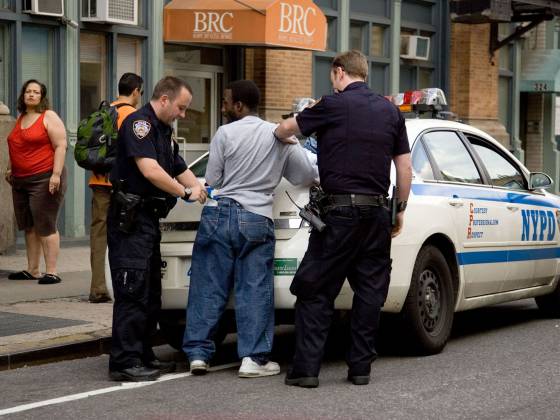BLACK LIVES MATTER
- August 23rd, 2016THE BLACK LIVES MATTERS MOVEMENT IS IN LARGE PART A RESPONSE TO RACIAL PROFILING AND HARASSMENT BY COPS. THESE ACTIVITIES BY THE POLICE ARE UNCONSTITUTIONAL. The 4th Amendment is what protects you from being stopped and searched for no reason by the police. The Supreme Court has let the police get away with more and more in recent years. Supreme Court Justice Sonia Sotomayor took a stand in the case of Utah v. Strieff. We need more judges like her.
The Fourth Amendment of the U.S. Constitution provides, "[t]he right of the people to be secure in their persons, houses, papers, and effects, against unreasonable searches and seizures, shall not be violated, and no Warrants shall issue, but upon probable cause, supported by Oath or affirmation, and particularly describing the place to be searched, and the persons or things to be seized."

SOTOMAYOR, J. dissenting
Writing only for myself, and drawing on my professional experiences, I would add that unlawful “stops” have severe consequences much greater than the inconvenience suggested by the name. This Court has given officers an array of instruments to probe and examine you. When we condone officers’ use of these devices without adequate cause, we give them reason to target pedestrians in an arbitrary manner. We also risk treating members of our communities as second-class citizens. Although many Americans have been stopped for speeding or jaywalking, few may realize how degrading a stop can be when the officer is looking for more. This Court has allowed an officer to stop you for whatever reason he wants—so long as he can point to a pretextual justification after the fact. Whren v. United States, 517 U. S. 806, 813 (1996). That justification must provide specific reasons why the officer suspected you were breaking the law, Terry, 392 U. S., at 21, but it may factor in your ethnicity, United States v. Brignoni-Ponce, 422 U. S. 873, 886–887 (1975), where you live, Adams v. Williams, 407 U. S. 143, 147 (1972), what you were wearing, United States v. Sokolow, 490 U. S. 1, 4–5 (1989), and how you behaved, Illinois v. Wardlow, 528 U. S. 119, 124–125 (2000). The officer does not even need to know which law you might have broken so long as he can later point to any possible infraction—even one that is minor, unrelated, or ambiguous. Devenpeck v. Alford, 543 U. S. 146, 154–155 (2004); Heien v. North Carolina, 574 U. S. ___ (2014). The indignity of the stop is not limited to an officer telling you that you look like a criminal. See Epp, Pulled Over, at 5. The officer may next ask for your “consent” to inspect your bag or purse without telling you that you can decline. See Florida v. Bostick, 501 U. S. 429, 438 (1991). Regardless of your answer, he may order you to stand “helpless, perhaps facing a wall with [your] hands raised.” Terry, 392 U. S., at 17. If the officer thinks you might be dangerous, he may then “frisk” you for weapons. This Cite as: 579 U. S. ____ (2016) 1 This Cite as: 579 U. S. ____ (2016) 11 SOTOMAYOR, J., dissenting involves more than just a pat down. As onlookers pass by, the officer may “‘feel with sensitive fingers every portion of [your] body. A thorough search [may] be made of [your] arms and armpits, waistline and back, the groin and area about the testicles, and entire surface of the legs down to the feet.’” Id., at 17, n. 13. The officer’s control over you does not end with the stop. If the officer chooses, he may handcuff you and take you to jail for doing nothing more than speeding, jaywalking, or “driving [your] pickup truck . . . with [your] 3-year-old son and 5-year-old daughter . . . without [your] seatbelt fastened.” Atwater v. Lago Vista, 532 U. S. 318, 323–324 (2001). At the jail, he can fingerprint you, swab DNA from the inside of your mouth, and force you to “shower with a delousing agent” while you “lift [your] tongue, hold out [your] arms, turn around, and lift [your] genitals.” Florence v. Board of Chosen Freeholders of County of Burlington, 566 U. S. ___, ___–___ (2012) (slip op., at 2–3); Maryland v. King, 569 U. S. ___, ___ (2013) (slip op., at 28). Even if you are innocent, you will now join the 65 million Americans with an arrest record and experience the “civil death” of discrimination by employers, landlords, and whoever else conducts a background check. Chin, The New Civil Death, 160 U. Pa. L. Rev. 1789, 1805 (2012); see J. Jacobs, The Eternal Criminal Record 33–51 (2015); Young & Petersilia, Keeping Track, 129 Harv. L. Rev. 1318, 1341–1357 (2016). And, of course, if you fail to pay bail or appear for court, a judge will issue a warrant to render you “arrestable on sight” in the future. A. Goffman, On the Run 196 (2014). This case involves a suspicionless stop, one in which the officer initiated this chain of events without justification. As the Justice Department notes, supra, at 8, many innocent people are subjected to the humiliations of these unconstitutional searches. The white defendant in this case shows that anyone’s dignity can be violated in this 12 UTAH v. STRIEFF SOTOMAYOR, J., dissenting manner. See M. Gottschalk, Caught 119–138 (2015). But it is no secret that people of color are disproportionate victims of this type of scrutiny. See M. Alexander, The New Jim Crow 95–136 (2010). For generations, black and brown parents have given their children “the talk”— instructing them never to run down the street; always keep your hands where they can be seen; do not even think of talking back to a stranger—all out of fear of how an officer with a gun will react to them. See, e.g., W. E. B. Du Bois, The Souls of Black Folk (1903); J. Baldwin, The Fire Next Time (1963); T. Coates, Between the World and Me (2015). By legitimizing the conduct that produces this double consciousness, this case tells everyone, white and black, guilty and innocent, that an officer can verify your legal status at any time. It says that your body is subject to invasion while courts excuse the violation of your rights. It implies that you are not a citizen of a democracy but the subject of a carceral state, just waiting to be cataloged. We must not pretend that the countless people who are routinely targeted by police are “isolated.” They are the canaries in the coal mine whose deaths, civil and literal, warn us that no one can breathe in this atmosphere. See L. Guinier & G. Torres, The Miner’s Canary 274–283 (2002). They are the ones who recognize that unlawful police stops corrode all our civil liberties and threaten all our lives. Until their voices matter too, our justice system will continue to be anything but. * * * I dissent.
(emphasis mine)
Call B-Luc if you have been arrested. Do not answer questions, do not consent to a search. Identify yourself and say "Officer, my lawyer has advised me not to answer questions, and not to consent to a search." You may be arrested, but your case will be much stronger if you don't help the cops gather evidence against you.
